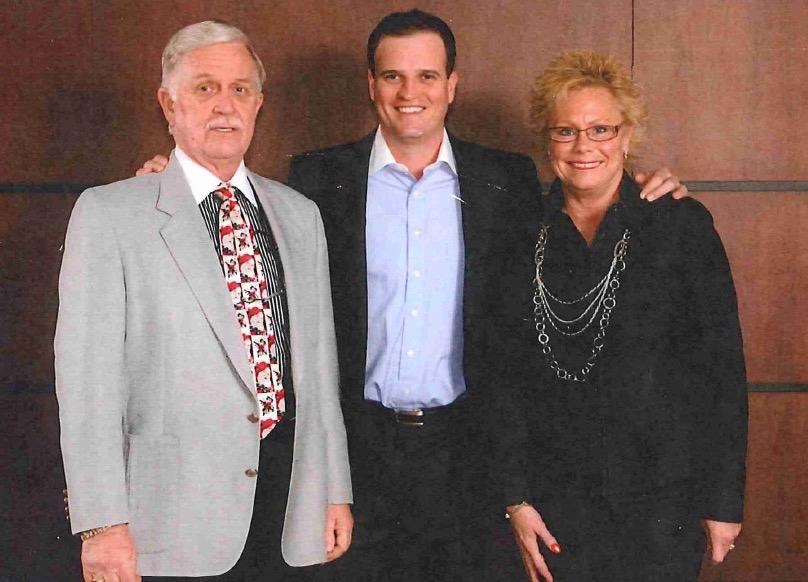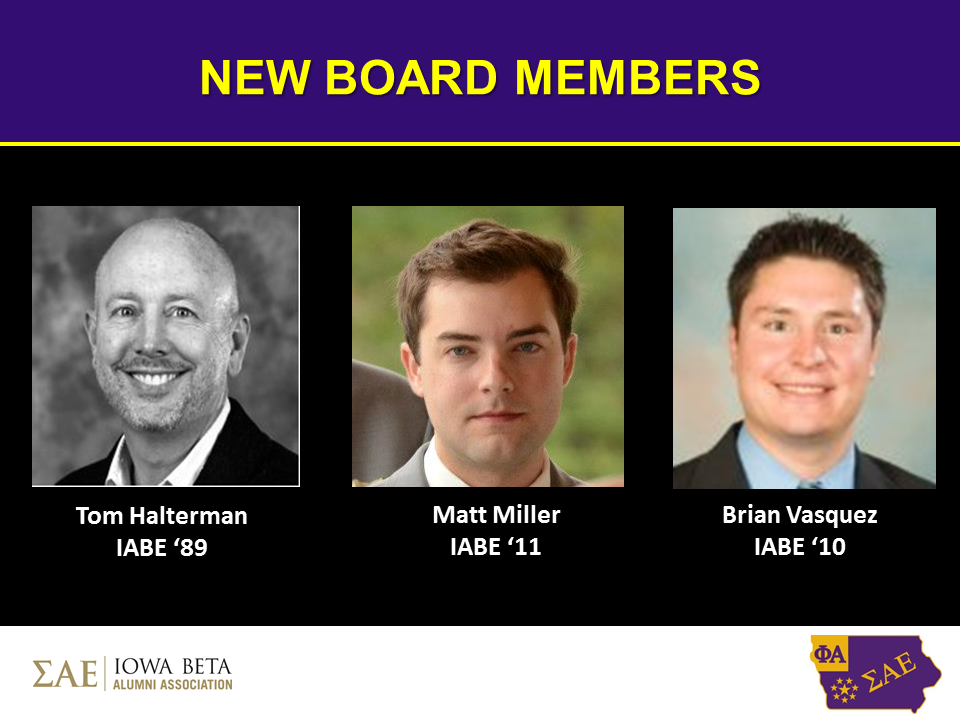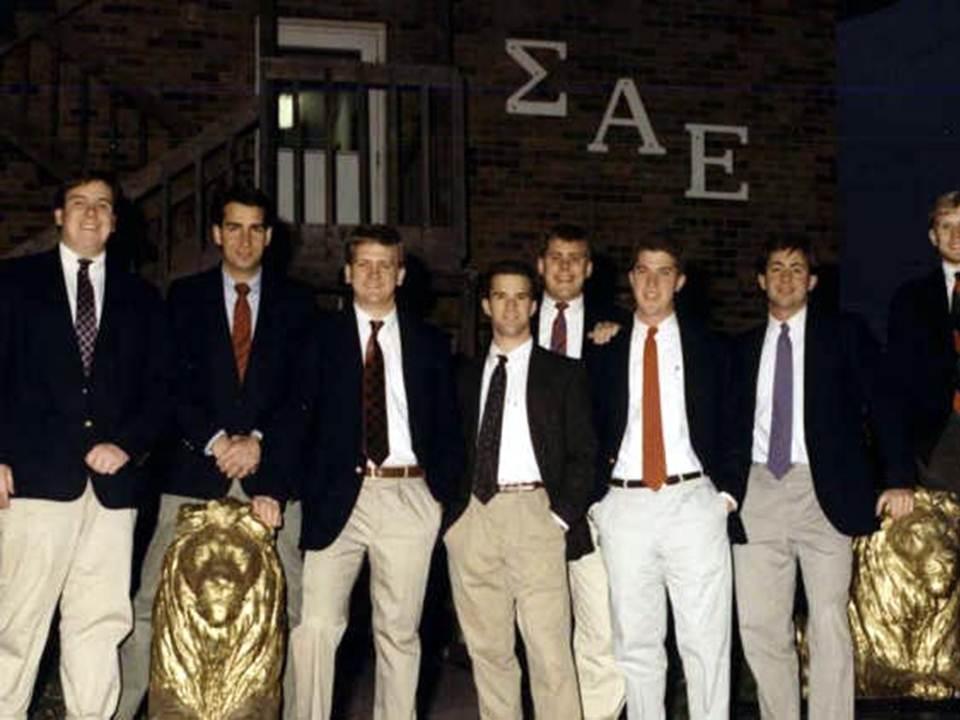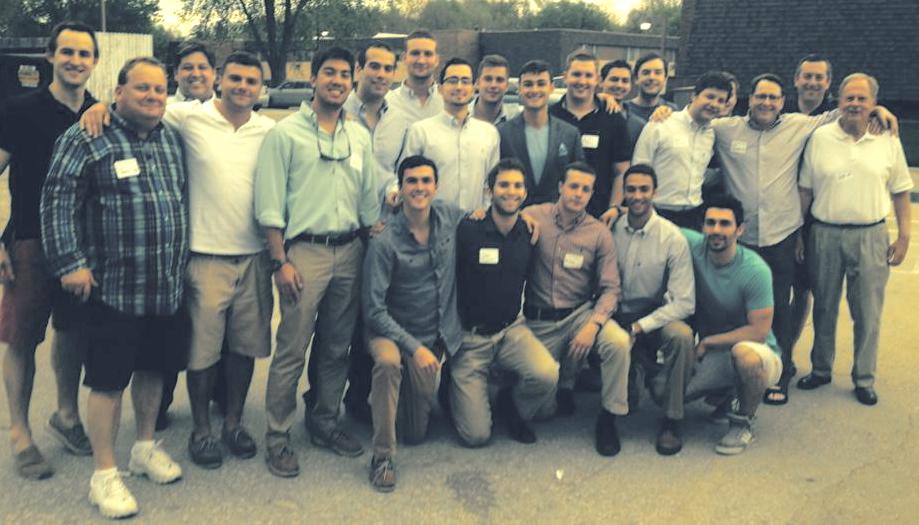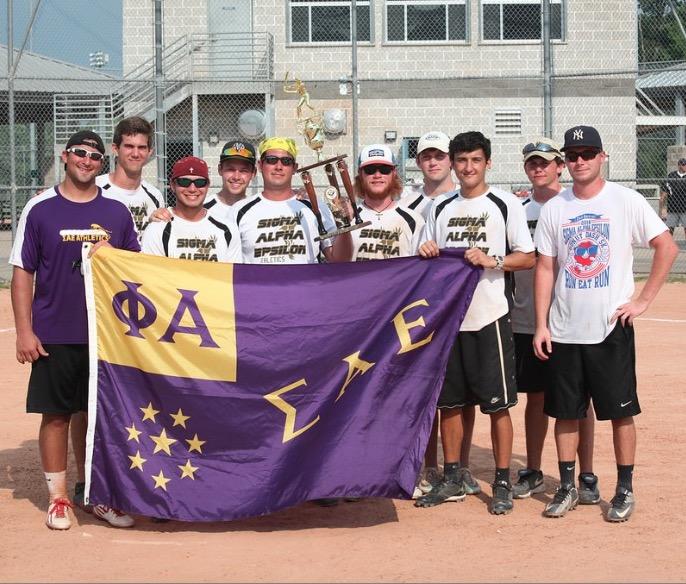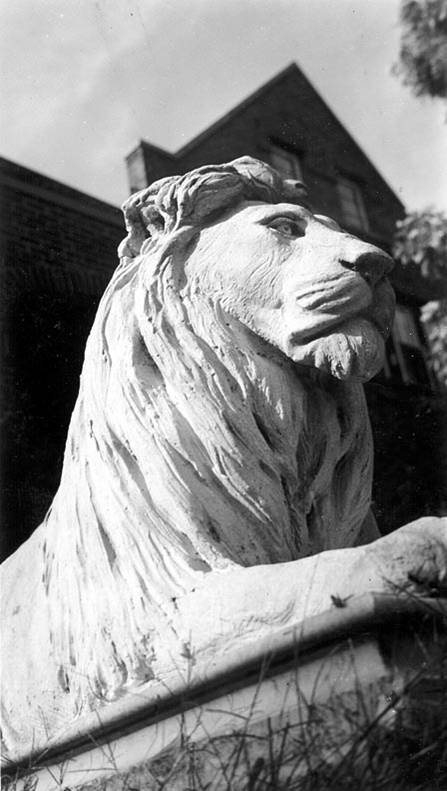Telling It Like It Is: The legendary Flip Klinger chats about his Iowa days, Hawk football, golf
By Greg Miller (IABE ’86)
Director and Chairman, Communications, Iowa Beta Alumni Association
This is the second in a two-part series, "Telling It Like It Is," that takes a look at Iowa Beta legend Flip Klinger.
If you ever run into Phillip D. “Flip” Klinger (IABE ’64) you may want to pour yourself a tall one, because he has an endless supply of great stories. Just sit down, get comfortable and let him go.
As I interviewed him for the alumni association newsletter, I definitely wanted to hear about some of the highlights of his days living in the SAE house.
Klinger served as pledge trainer one semester and in his last semester, was elected Eminent Archon. In those days, the EAs were elected every semester.
“Did you like the job?” I asked.
“No, it was a pain in the ass,” Klinger said. “You couldn’t drink in the house or anything else. You had to be nice and diplomatic. And I am not saying who, but when I was Eminent Archon we’d be sitting there and I’d say, ‘It’s cold outside right now and we don’t want to get out and buy beer, so let’s go see who is drinkin’. So we would wander about the halls and if we found someone had a six-pack, we’d confiscate it.
“I would say, ‘there is no drinking in the house and I am the Eminent Archon and I am taking it from you.’ Then my co-enforcer would go down to my room and we would sit and drink it. Who’s going to do anything about it?”

As new initiates in late March 1961, Klinger and his comrades, Ed Spence (IABE ’63), John McSwaney (IABE '64) and two others decided to go see a movie, Where the Boys Are, the week before Easter. The plot involves four very different college girls who drive to Fort Lauderdale, Fla. for spring break to seek out various adventures and romance for themselves. When Klinger and his buds strolled out of the movie house at 3 p.m. they were so inspired that nine hours later at midnight, they took off to Florida.
“I had a paper that was due and we all got our work turned in and we piled in Ed (nickname “Runt”) Spence’s car and drove without stopping to Fort Lauderdale,” Klinger said.
(If you want to take a look at Google maps, you will see that Fort Lauderdale is about 1,454 miles from Iowa City.)
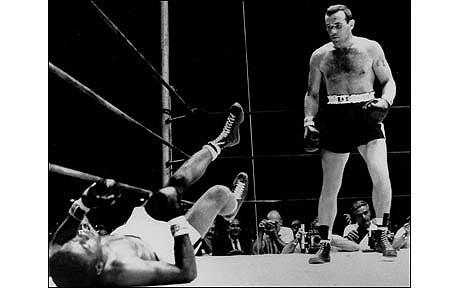
“So we get there, I guess it was mid morning a day later and we are standing outside of this restaurant and we get to talking to this guy,” Klinger recalled. “And there was a great big guy standing next to him and we hadn’t the slightest idea who he was. All of a sudden, we find out the big guy was Ingemar Johansson.”
In 1959 Johansson defeated Floyd Patterson by TKO in the third round, after flooring Patterson seven times in that round, to win the World Heavyweight Championship.
“Johansson took us all inside and bought us breakfast,” Klinger said. “We didn’t have any money. I got a postcard in the restaurant, had Johansson sign it and I sent it home to my folks.
"On it I wrote, 'Here is a post card signed by Ingemar Johansson and, oh by the way, I won't be home for Easter because I am in Florida!' We were down there for many days and all we had was about $50 apiece – and that included gas money. We had to sleep on the beach mostly and yeah, we slept in jail one night. It was a hoot.”
The tomfoolery did not stop there. Back in Iowa City, if there was mischief afoot, you can bet Klinger was in the middle of it.
“The Phi Gam house was right behind us,” he recalled. “And if you sit there in the SAE house in the solarium and look at their house, they had a big picture window that faced us. Well, there was a similar window in front of their house. So, oh, I dunno, a couple three times I was in Iowa City, late at night we would round up all the garbage cans we could and put them out behind that back window. We’d fill them with paper, douse some gas on there and toss a light to it. Then we’d call the fire department and tell them the Phi Gam house was on fire.
"And of course the fire trucks and police cars would come flying up that hill and look in the front window and freak out as they would see that there were flames going high in there someplace. The firemen would go charging through the front door with a fire hose. And good thing they would figure out before they turned on the hoses that the flames were coming from outside the back window!"
“They suspected, but they couldn’t prove it. They kind of figured it had to be us.”
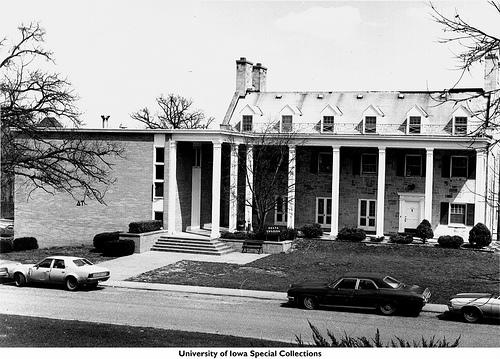
But of course, the shenanigans didn’t stop there.
“Across from the Phi Gams were the DUs,” he said. “So we would steal the Phi Gam’s hose. And for some reason, they always had a hose hooked up to a spigot during the spring and fall. And every now and then, around two in the morning, we’d drag that hose over to the DU house and hook it up to the DU spigot. Then we’d take the hose through the front door, lay it into the living room, turn it on and walk away. And they’d not find out about it until the next morning. Yeah, we used to have fun. It was a different world.”

Klinger said that it was amazing how people survived living in the Chapter House during those days.
“Oh man, you wiped your feet on the way out of the House!”
He continued, “I remember one fall my dad came down and said, ‘I can’t believe this, g-- dammit, I am paying for you to live in this place?! If this is all I gave you at home, you’d leave.’ And he was right, at times it was a dump. And yeah, this was 1960. But you don’t even realize how slovenly you are living. You are in college and you are the king of the world.”
Klinger said serenading and singing were a big part of the fabric and culture.
“Most guys did not have cars,” he said. “You walked. Whether it was the middle of winter or whatever, you walked back and forth across that footbridge over the river. And we were the singing fraternity.
“The men would sing every night at dinner. You sang grace before the meal and the house mother was there, a woman named Mom Anuson.

“She was hoot because she had one ear that could not hear very well,” he said, “And we would always say, ‘hey mom, we’re having a big party tonight upstairs so you better have your bad ear up.’
“And we would play bridge with her at night because there was always a bridge game going on in Mom’s room.
“She ate dinner with us every night except one each semester. We’d say, ‘Hey mom, maybe you ought to go out to dinner with some of the other house mothers tonight because tonight is ‘Rowdy Night.’ (This is a watered-down term for a food fight.) And I worked on the board crew and we could pick a night unbeknownst to anyone when food fight night was going to be.
“So instead of coming out and serving the brothers their dinners, we’d come out and just throw it at them. And this really pissed off the pledges because they had to wear coat and ties every night for dinner. And our favorite was mashed potatoes because you can hurl them a long way!”
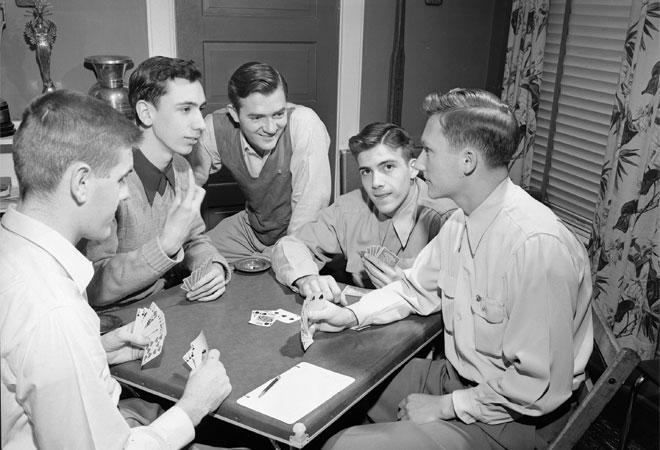
The Ritual with robes was executed on regular basis and it was required that everyone memorized basic facts, The True Gentleman and songs.
“That was part of pledge training,” said Klinger. “We had a pledge class that met every Monday night. And there were work sessions every Friday night. In those days, guys had to hustle the girls home to be in the dorm by curfew. On Friday nights, the pledges had to race back to the SAE house by 12:30 a.m. to clean it top-to-bottom. While they cleaned, the actives would leisurely sit in the solarium and play cards. And this is when we’d quiz the pledges on what they had been studying.”
And God forbid if someone asked you what time it was. According to Flip, the proper and correct response was as follows:
Sir, I am greatly embarrassed and deeply humiliated.
Due to circumstances beyond my control, the inner workings and hidden mechanisms of my chronometer are in such in accord with the great sidereal movement.
Therefore I cannot with any degree of accuracy state the correct time. But I do predict the exact time to be…
“Oh yeah, we had to say stuff like that and if you screwed it up, especially during Hell Week, it was all over. They had to come up with weird stuff like that because they knew we had the Greek alphabet memorized forwards and backwards for months.”

There’s no doubt the SAEs enjoyed a lot more freedom and less regulation in the early 1960s and like all young men, they had their sights set on the ladies.
“In the warmer months, we’d would go up to the third-floor penthouse up there we’d have a large telescope and we’d point it across the river and watch the girls sunbathe on the top of Currier Hall,” he said. “And if it really got good, we’d take our equipment up to the roof.”
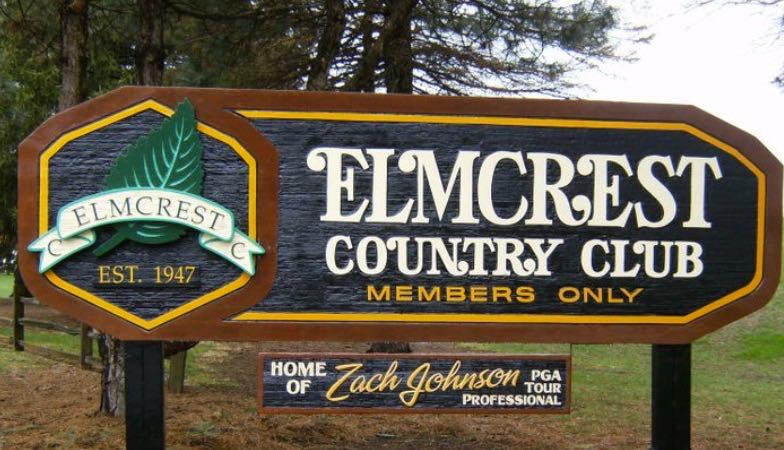
One of Klinger’s passions is to hit the links and participate in all that ensues thereafter.
“I am the world’s worst golfer,” he explained. “To me golf is the three to four-and-a-half hours of shit you have to go through to get to a cocktail. And golf is great when you are married because if you said to your wife while at work, ‘honey, I am taking the afternoon off to go drinking in a bar,’ she’s be pissed. But if you tell her I am going to go and play golf with some of the guys this afternoon and have a cocktail afterward, she wouldn’t say a word other than ‘OK, that’s fine, have fun!’ ”
Klinger belongs to Elmcrest Country Club in Cedar Rapids, which is one of the best-kept courses in the state of Iowa and home to PGA veteran and Master’s winner Zach Johnson. Klinger represented Johnson and wrote his professional contract. He plays golf with his father, Dave, twice a week year round.

“Golf, year round? In freezing Iowa? How in the heck do you do that?” I asked.
“We have computer simulators where you can play inside in the winter time,” Klinger said. “I played ‘Pebble Beach’ last week. But what else are you going to do around here? It is colder than hell in the winter, no mountains within a thousand miles. There’s no skiing. It’s hotter than hell in the summer and there’s no water. There’s no big lakes around here. You have to go to the lakes of the Ozarks for big water or up to the Great Lakes in Minnesota.”
To get in this amount of golf, there has to be a plan and rules.
“We just hired a receptionist three months ago and I said, ‘look, you might as well know, every Wednesday and Friday I have a 1 p.m. tee time. So you make no appointments for me after 10:30 in the morning on those two days without my permission. If you do make an appointment for me during those times, you’re fired and the last thing you do before you leave is to call the person and cancel the appointment.”

Having lived with Iowa football greats, Klinger is a die-hard Hawkeye football fan.
“I had season tickets from 1960 to 1999,” he said. “Julie (his wife) got sick and she could not take it.”
Julie, who died in March a year ago, was a 15-year, third-stage pancreatic cancer survivor. She was diagnosed with the disease in the winter of 1998. She underwent 25 radiation treatments at the Iowa City Hospitals and in Flip’s terms, “was tethered to a chemo drip” in the hospital for two weeks.
“They gave her four to six months,” Klinger said. “But she was the type who thought that was just not good enough. There was only one Julie.”
Julie, who was a stockbroker at Morgan Stanley, ended up at the Mayo Clinic where she was one of the first to undergo the new intraoperative radiation treatments where the medical staff would cap the tumor and radiate it.
“We knew for 15 years we were on borrowed time and she worked all the way through it,” he said.“She was her own person and took no shit from anybody. But we quit going to football games because she could no longer tolerate the day-long experience.”
And the Klinger home football game ritual is not for the faint of heart.
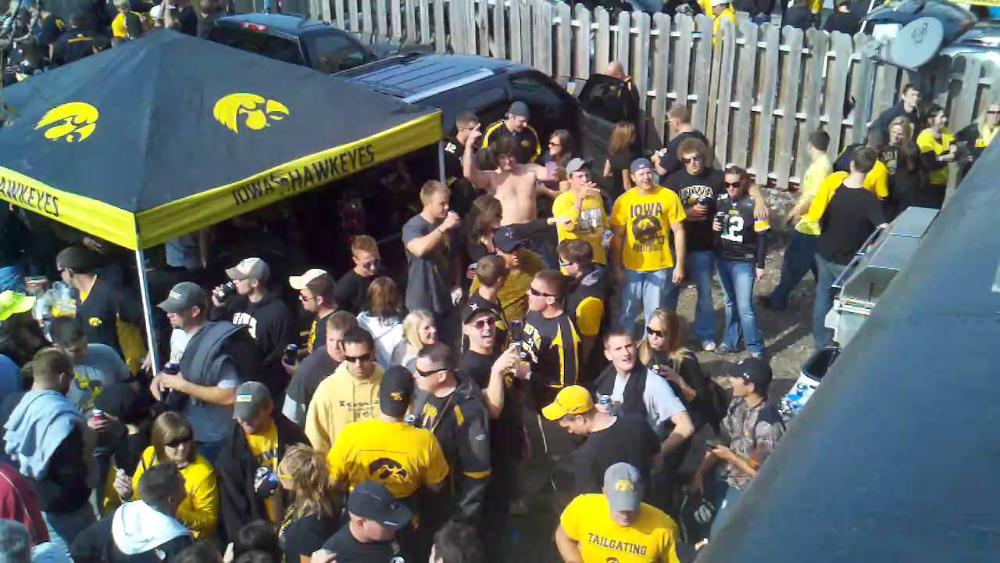
“I’d get up in the morning and make a pitcher of Bloody Marys,” he said. “I’d
drink them through a straw while I was in the shower and getting ready. And bloodys would flow until we got into the vehicle and then we’d all drink beer on the way down to Iowa City. At the tailgate, there would be more beer and wine. Depending on how cold it is, we’d carry either a bottle of bourbon or brandy inside the stadium.
“And God, I had great seats for 25 years. We were at the top of tunnel at the 5-yard line. It was fantastic because there was no one in front of us.
“And the first year I got those six seats, the three guys are sitting there having cocktails with the three women when all of a sudden the damn security people came up and took our booze away. Well, that kind of pissed us off. So we are sitting there and we got a bunch of ice cubes, so we start throwing them down on the security people.
“And they came to us and said, ‘hey you can’t do that.’ And we said, ‘well look, it’s going to be a long season and you came up here and took our drinks and we got to have some fun. And you can’t get on me for spilling ice, I mean my glass just accidentally tipped over…I can’t help that.’ ”

The security people sensed what they were in for and told Klinger’s party that the way they knew they had alcohol is because there is a spotter in the press box who radios the security people.
So the sly Klinger, worked out a solution. He proposed that his party buy plastic Hawkeye cups and keep the booze down by their feet. The security people said if that scenario occurred, the spotter would not be able to catch on and he would not radio them to enforce. So for the next 24 years, cup-and-low-pour protocol became institutionalized.
“But you got to remember, we did this 12-hour ritual before football games were on TV,” Klinger said. “Now my friends ask me, ‘are you going to the game?’ And I say, ‘why would I want to go to the football game?

“First, I can watch the game on my big screen TV. I got instant replay and pause functions. I am in my comfortable chair. I am can see my refrigerator full of beer and booze and I am first in line at the pisser. Why would I want to go down there? My wife would make me any kind of hors d’oeuvre hot off the stove. And if I wanted to smoke, I could just make a quick step outside. Hell in Iowa City, they are trying to ban smoking in the parking lot!”
Through all the years, Klinger has always gone back for seconds at the bountiful feast life has to offer. SAE helped him enjoy that harvest.

“Hell, I wouldn’t have known how to set a table if I did not have the fraternity experience,” he said. “And it doesn’t sound like much. But hey, when you sit down to a fine meal, you know what all the forks are for and that you are to use the utensils from the outside and work toward the plate. You don’t feel embarrassed because you know what you are doing. You know the proper way to hold your fork and feed yourself.
“SAE taught you how to give someone a firm handshake and look them in the eye.
“College gives you knowledge but SAE gave me the people and social skills to maneuver properly in society,” he said. “SAE taught me manners and how to engage people. It gave you an opportunity to break out of your shyness so you can speak and act with confidence. But most of all, SAE teaches you how to be a gentleman. It gives you the blueprint of the inner workings and mechanisms of how to be a man; how to be responsible and accountable.
“In SAE, you make friends for life.”
Iowa Beta Alumni Association elects three additional Directors at its March 2015 meeting
The Iowa Beta Alumni Association proudly announces that three new additional board members have been elected. Longtime Director Bill Hayes (IABE '92) retired from the board after serving for nine years, creating an opening on the Board that was publicy announced last month.
Three brothers volunteered to fill the vacancy, prompting the Board of Directors to amend its bylaws to allow for all three to join the alumni association's governing body, given their outstanding talent and commitment to the fraternity.
Tom Halterman, a native of West Des Moines, currently serves as the Des Moines-area chairman for the Iowa Beta Alumni Association and has been an Ex Officio member on its board for nearly two years. He now joins as a full Director.
Halterman has been very active with the alumni association, organizing events, recruiting members and supporting its programs and initiatives.
In addition, Halterman is the vice president of the Polk County I-Club for the University of Iowa. As an undergrad, Halterman served the Iowa Beta chapter in many roles including two very successful terms as Eminent Archon. He has the distinction of serving as EA for the second-longest tenure of any president since the Chapter's re-founding in 1982.
Halterman is the founder and CEO of Des Moines-based Outcomes MTM, the nation's leader in the design, delivery and administration of Medication Therapy Management programs.
Matt Miller hails from West Des Moines and now lives in Kansas City, where he is a solutions architect for Cerner Corporation, a leading provider of information technology to health care providers. Miller commutes to cities on the east coast each week where he manages teams of people implementing electronic medical records solutions.
Miller served the Iowa Beta chapter in many capacities during his collegiate years, including scholarship chairman and Eminent Archon. During Miller's tenure in office as EA, the chapter saw strong improvement in all key metrics. Because of his ability to identify issues and solve problems with practical solutions achieving measurable results, Miller is widely regarded as one of the stronger EAs of the recent era.
Miller has been very active in the Iowa Beta Alumni Association, recruiting several members and finding career opportunities for a number of recent Iowa Beta graduates.
Brian Vasquez hails from the Chicago area and currently resides in Palatine, IL. Vasquez is the agency sales representative for Par Logistics, one of the nation's largest minority-owned transportation and logistics companies, which is headquartered in nearby Schaumburg. The company provides high quality customized transportation solutions and supply chain delivery ranging from standard truckload to hot-shot services to air cargo.
As an undergrad, Vasquez was very involved in the Chapter and served on numerous committees. Additionally, he served as Eminent Recorder as a sophomore and was an outstanding Social Chairman during his junior year.
Vasquez has been very active with the Iowa Beta Alumni Association, helping recruit members, support programs and initiatives and attend various events. Additionally, he created internship and career opportunities for Iowa Beta brothers at his firm.
The three new Directors will join current Board Members Randy Iskowitz (IABE '88), Brian Kingery (IABE '91), Brian McKenzie (IABE '08), Greg Miller (IABE '86), Marc Rosenow (IABE '86), and Bill Stelter (IABE '88). Additionally, they will serve along side Ex Officio members John Ressler (IABE '99), Don Souhrada (IABE '93) and Bill Vipond (IABE '86). Flip Klinger (IABE '64) serves as the Registered Agent.
"We could not be more excited that these three Brother Heroes have been elected to our Board," said Rosenow, president of the Iowa Beta Alumni Association. "They bring tremendous enthusiasm and new perspectives that will continue to strengthen one of the finest alumni organizations in the SAE realm."
QUIZ ANSWER: The lyrics of Violet
In 1910, the fraternity song Violet was written by the team of Harold V. Hill (Illinois 1911) and Howard R. "Hod" Green (Illinois 1911). At the time, these men were college students and SAE fraternity brothers at the Illinois Beta chapter. They also composed Hail to the Purple! Hail to the Gold!, which they wrote for the fraternity but repurposed the song for the University of Illinois, where it may be better known as Hail to the Orange! Hail to the Blue! to most Illini fans.
Singing was big part of college life in those days, but many songs were written so the student with an untrained musical voice could not sing them properly. Violet came about as a musical collaboration "for the man with the one-octave range."
The song was written in one hour, with Hill creating a melody at the piano to which Green set the words. It became an instant hit with the Illinois Beta chapter.
Upon a visit to Illinois and hearing the song performed by several of the men, William C. "Billy" Levere (Northwestern 1898) asked to publish the song in the latest version of the fraternity's songbook and it soon became one of the most beloved of all the SAE songs.
Violet
Wherever you may go
There are flowers that you know
The fragrant lilacs, red rose,
Or Gardenia white as snow.
Each flower may bring a dream to you
As one flower does to me,
A dream of friendship firm and strong
In my Fraternity.
Chorus
Violet, Violet
You're the fairest flower to me.
Violet, Violet
Emblem of fraternity.
With your perfume memories come
Of Sigma Alpha Epsilon
Dearest flow'r beneath the sun,
My Violet
Did You Know?
Sigma Alpha Epsilon adopted the violet as the fraternity's official flower at the Atlanta Convention of 1891.
The violet was selected because of its vibrant purple flowers (the colors of the fraternity are Royal Purple and Old Gold.)
The precise species of violet adopted by the fraternity is not specified but the most likely suspect is the Viola walteri ("Walter's Violet"), which grows wild in Alabama and is in bloom from late winter to early spring.
The Viola walteri features beautiful purple blossoms on stems that can reach six inches in height. It bears evergreen leaves that are pale-to-dark in color and thrives in moist, acid soils in partially-to-fully shady locations.
It was along the banks of the Black Warrior River in Tuscaloosa, Ala. that Noble Leslie DeVotie first discussed the idea of starting SAE with some of the other Founding Fathers.
As they walked along the riverbank and planned a new fraternity, it is no doubt that they came upon Viola walteri growing in the soil -- making the wild violet the perfect flower for SAE.
Hold the Date!
Thursday, July 30, 2015
Iowa Beta Alumni Golf Outing
Brother Doug Banzuly (IABE ’86) has graciously offered to chair a social event for golfers and non-golfers alike to take place at Green Acres Country Club, one of the Chicago area’s most prestigious country clubs.
The start time for golfers is 11 a.m. Lunch, cocktails and heavy hors d'oeuvres will be served. Carts, 1 caddy per foursome, and other amenities will be available.
For non-golfers, the start time is 5:30 p.m.
Green Acres Country Club in Northbrook, IL
More details to follow.
Please click the "GOLF" button below to inquire further:
Class of 2015 Graduation BBQ
Each year the alumni association hosts a celebration for our newest alumni in the form of a BBQ accompanied by Ritual.
The BBQ events have been a huge success over the past two years and we are pleased to continue the tradition for the Iowa Beta Class of 2015.
This will be the final graduation event prior to Iowa Beta returning to campus next fall.
The graduation BBQ event will take place Saturday, May 9, in Iowa City.
The location is the Environmental Education Center at the East Side Recycling Center, 2401 Scott Blvd. in Iowa City.
The event will begin at 3 p.m. with a business meeting, followed by Ritual and the BBQ. More details will be provided to those who RSVP.
All alumni are welcome. To ensure that we have enough food and beverages, please click the RSVP button if you would like to attend.
To grow stronger, we need your help
The Annual Campaign for Iowa Beta is on!
The Iowa Beta Alumni Association is recognized by the IRS as a Section 501(c)(3) nonprofit organization, which is dedicated to the education and development of True Gentlemen.
For the past few years, we have worked hard to keep you proud of Iowa Beta, and our programs and initiatives have been recognized as being among the very best in the country.
The alumni association does not charge membership dues because it wants to make sure everyone is able to participate regardless of financial circumstance.
But the Association does need periodic private funding support and your gift of any size is tax deductible to the fullest extent of the law.
"We are very grateful to those who have already made a donation this year to strengthen the alumni association," said Fundraising Chairman Don Souhrada (IABE '93).
"If you have not yet had a chance to make a small gift, we cordially invite you to do so today."
Some brothers can give more, some less, but your gift of any size will make a difference.
Please click the "DONATE" button to make a contribution today or please mail a check to the Iowa Beta Alumni Association at the address below.
Phi Alpha!
Be a part of the nation's best site
The Iowa Beta Alumni Association is looking for interesting stories from and about our alumni to share in the best alumni newsletter in the United States.
Tell us about a brother you know that is making a big impact. What is something interesting that is happening that our brothers should know about? What's your story? Good and interesting news deserves to be shared.
We can't read your mind but we can read your email. Please share with us a story idea you think would benefit the Iowa Beta Alumni Association by clicking the "Newsletter" button below.
SAE softball tourney set for June in New Orleans
It was started approximately 28 years ago by Geary Mason and members of the New Orleans Alumni Assn. of Sigma Alpha Epsilon.
This successful all SAE event is open to any SAE active or alumni group who want to compete with other SAE teams.
Some tournament details are:
It is open to any SAE active or alumni. You must be an SAE to play softball. Family and friends are welcome to attend;
Double elimination format. Each team plays at least twice;
Entry fee of $250 per team. Only $200 if pay before June 1st. You can register via the website;
Professional umpires provided;
Post tournament party at the Tropical Isle on Bourbon Street in historic French Quarter. Free dinner buffet provided;
Discounted lodging available. See website for details;
Awards given to top three teams and special awards given (Most Improved team, Best Dressed team, SAE Spirit award, Farthest Distance Traveled, Last Place award, MVP and more);
If you would like to attend as an individual, you can be placed on a team.
At least 20 teams from across the country are expected to come to New Orleans to compete to become Eminent Supreme Champions. Click here for more information.
